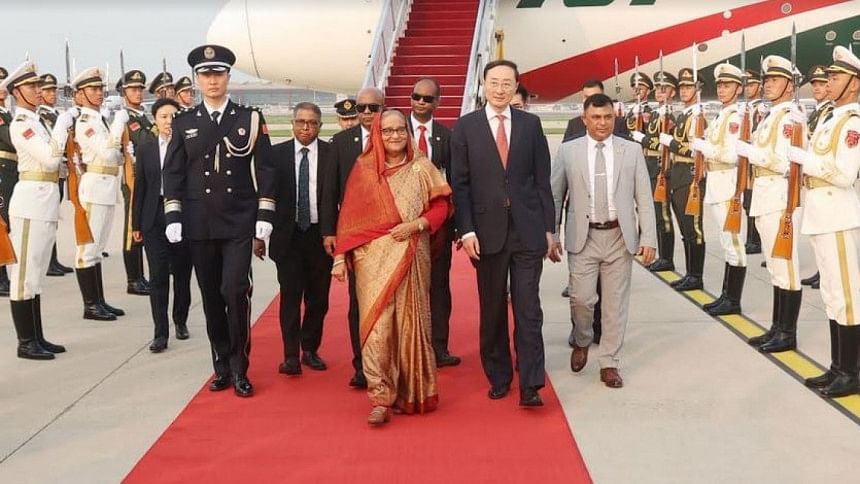PM’s China visit: Dhaka now has to play its cards right
Prime Minister Sheikh Hasina’s China visit has laid the foundation for a forward-looking and expansive relationship and Dhaka now needs to play its due role to make the most of it, according to international relations analysts.
Following their meeting on July 10, Hasina and Chinese President Xi Jinping announced the elevation of the bilateral relationship to “Comprehensive Strategic Partnership of Cooperation” (CSPC) from the “Strategic Partnership of Cooperation” established in 2016.
The elevation of the bilateral relationship to CSPC means the cooperation will deepen in all the sectors possible keeping in mind Bangladesh’s vision for 2041, said M Humayun Kabir, a former diplomat.
Xi and Hasina agreed to “foster greater synergy between development strategies of the two countries”, according to the joint statement issued on the conclusion of Hasina’s three-day tour.
The Asian giant has huge capabilities in funding, technology, clean energy, healthcare, infrastructure and so on, according to Kabir.
“The question is if Bangladesh will be able to take advantage of the new relationship with China,” he said.
The two sides agreed to deepen cooperation in trade, investment and finance, and to conclude the joint feasibility study on a China-Bangladesh free trade agreement.
“This will significantly boost trade between the two countries,” said Kabir, also the president of Bangladesh Enterprise Institute, a non-profit, non-political research centre.
China is Bangladesh’s largest trading partner by a wide margin, with bilateral trade amounting to upwards of $25 billion. However, Bangladesh’s exports account for less than 3 percent of the sum.
“China has completed the entry procedures for Bangladesh’s fresh mango exports to China, and welcomes Bangladesh to expand exports of jute, leather, aquatic products and other high-quality special products to China. The two sides agreed to further strengthen communication on the export of high-quality Bangladeshi agricultural products to China,” the joint statement said.
Ahead of the three-day visit, there was expectation that Beijing would provide a $5 billion loan in yuan for trade facilitation to help Bangladesh cope with the strain on currency reserves, and billions more for projects.
At a press briefing after Hasina’s meeting with Li Qiang on Wednesday, Foreign Minister Hasan Mahmud said China has agreed to provide 1 billion yuan (about $137 million) in assistance. However, the joint statement does not mention this assistance extended to Bangladesh.
China has now become more cautious in giving out loans after it was blamed for the economic crisis in some countries such as Sri Lanka, said Kabir, who served as Bangladesh’s ambassador to Nepal and the US and the high commissioner to Australia.
In case of Bangladesh too, China is exercising the same caution.
For instance, China has decided to form a joint technical committee for assessing the projects proposed by Bangladesh, Kabir said.
“I would say that this visit is meant to build a relationship that is futuristic and expansive,” he added.
China committed to provide about $20 billion during Xi’s visit to Dhaka in 2016 for a host of mega projects. Some of the projects are yet to be implemented. So Bangladesh did not get the full amount pledged.
“So, China wants better scrutiny this time — Beijing would like to look at the nitty-gritty of the projects this time,” said Mahbub Uz Zaman, former ambassador to China.
Xi spoke about building party-to-party relationship between the Communist Party of China (CPC) and the ruling Awami League in Bangladesh. He said “good governance requires good party”.
Asked what this means, Imtiaz Ahmed, executive director of the Centre for Alternatives, said: “This is Chinese approach of building relationship, which they do everywhere. Through this, they find it easier to implement their policies.”
The Awami League can learn discipline and governance of the party from the CPC, said Ahmed, also a professor of international relations at the University of Dhaka.
Xi also assured Hasina of support for repatriating the more than a million Rohingya. However, analysts say how far it will work will depend on the situation in Myanmar, which is now going through a civil war.
Repatriation has not been possible in the last seven years despite several efforts including under a tripartite mechanism under Chinese leadership.
On this, Kabir said: “Chinese assurance is great and is required for the solution, but we will have to wait to see what happens in Myanmar, particularly in the Rakhine State in the days to come.”
LondonGBDESK//



Comments are closed.